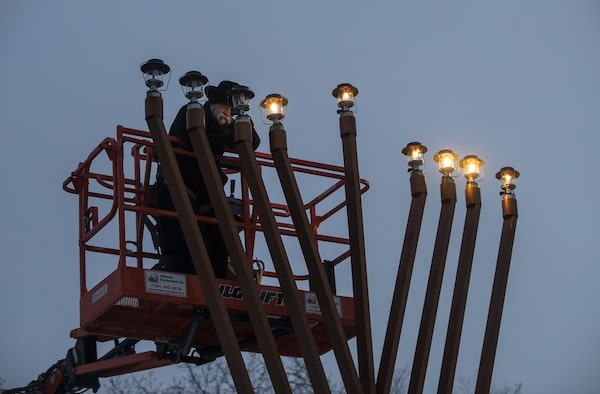
A Rabbi lights a giant menorah for Hanukkah in Edmonton. The decision to ban the Hanukkah menorah and nativity scene displays outside Moncton's city hall prompted a petition with more than 6,000 signatures.JASON FRANSON/The Canadian Press
Moncton city officials have reversed a decision to ban the Hanukkah menorah and nativity scene displays outside city hall after a nationwide furor from Jewish groups and Ottawa.
Last week, in what Mayor Dawn Arnold said was an attempt by the city “to be more inclusive toward our community” and all its faith groups, council decided behind closed doors not to install the Christian and Jewish religious symbols.
“However, we obviously fell short in this transition. Despite our best intentions to do the right thing, we acted too quickly,” she wrote in a statement ahead of a city council meeting Monday.
Council voted unanimously on Monday afternoon to rescind the decision to ban the religious symbols.
“We deeply regret the emotional distress caused by our insensitive decision,” Ms. Arnold said after the vote.
Council’s hasty and secretive decision-making sparked anger and condemnation across the country over the weekend, with several local Jewish leaders pointing out that other Christmas decorations, including a holiday tree and illuminated angels blowing horns, remain on display.
Toronto and Moncton-based lawyer Leigh Lampert said he was on a call last week to discuss the decision with city officials, and their rationale was a 2015 Supreme Court of Canada decision prohibiting religious prayers at municipal council meetings.
“I’ve read that case, and it’s not on point,” said Mr. Lampert, who is also a board member of Moncton’s Tiferes Israel Synagogue. He added that the court decision actually supports multiculturalism and not excluding or showing preference to any one religion.
“I think that what happened here is a decision was made that is actually discriminatory.”
Over the weekend, councillors’ inboxes flooded with hundreds of e-mails as news of the ban made the rounds on social media. The decision also prompted a petition with more than 6,000 signatures; a letter to the mayor from the president and chief executive officer of Friends of Simon Wiesenthal Center, Michael Levitt; and Minister of Public Safety Dominic LeBlanc expressing his disappointment.
“I encourage city councillors to reconsider this decision,” the MP for Beauséjour, N.B., wrote on X Monday morning.
Federal Conservative Leader Pierre Poilievre also decried the decision.
“What a shame that Moncton city hall backed down to antisemitism,” he wrote on X. “Conservatives stand with Jewish Canadians against hatred and bigotry.”
John Ibbitson: Jewish Canadians living in rising fear as violence and vitriol increase
Yossi Klein Halevi: Once again, Jews are feeling very much alone
On Monday afternoon, some community leaders spoke out against the ban at the regular city council meeting.
Mr. Lampert’s father, Irwin, who is the former president of Tiferes Israel Synagogue and a retired provincial court judge, spoke about the pain the decision to halt a 20-year-old tradition of lighting the menorah has caused.
“The removal of the menorah feels like a blow to our already abandoned community,” he said at the meeting, referring to a rise in antisemitism.
“I know that you were concerned that if the menorah was to be vandalized, the City of Moncton would suffer embarrassment,” he added. “But no one would hold the City of Moncton responsible. Quite the contrary: The city should be credited for showing strength and leadership in the eyes of potential intimidation.”
The Israel-Hamas war has led to an increase in acts of hate, including against Jewish communities. Last month in Montreal, two Jewish schools were targeted in overnight shootings and police are investigating two fire bombings that caused minor damage to a synagogue and Jewish advocacy group’s building.
Councillor Marty Kingston apologized at Monday’s meeting for his lack of understanding of religious symbolism and not thinking the decision through more carefully.
“We didn’t really get into it fully as we should have,” he said. “I learned a lot over the weekend. When you get 500 e-mails, you pick up on history pretty quick.”
Councillor Daniel Bourgeois, who holds a PhD in public-policy analysis, apologized for the lack of process and described making a public decision behind closed doors “as a knee-jerk reaction to a situation that unfolded too rapidly.”
“Mea culpa,” he said. “Maybe we wouldn’t be here tonight if I had done my job properly.”